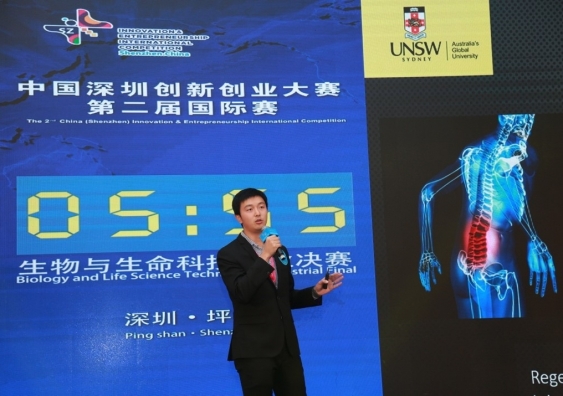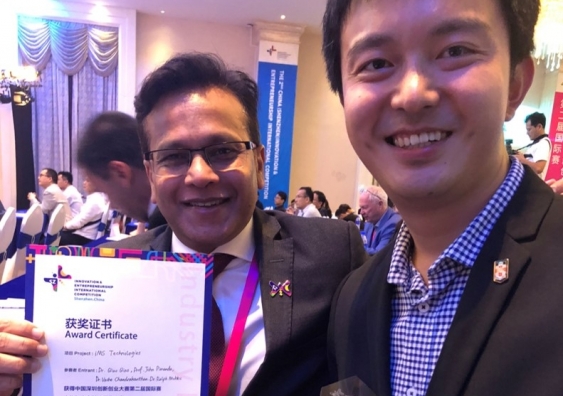UNSW team cracks top 10 of international innovation competition with stem cell project
A team of UNSW researchers secured a top 10 place in a major innovation competition by showcasing the potential of a world-first stem cell technology.
A team of UNSW researchers secured a top 10 place in a major innovation competition by showcasing the potential of a world-first stem cell technology.

Ivy Shih
UNSW Media and Content
(02) 9385 9555 , +61 466634161
i.shih@unsw.edu.au
A UNSW Sydney team was the only Australian team to make it to the grand final – subsequently placing in the top 10 – at a major innovation competition hosted earlier this year in Shenzhen, the ‘Silicon Valley’ of China and the country’s main innovation hub.
Over a marathon three-month period, teams that were shortlisted from over 1460 applications presented their start-up ideas to a panel of judges across the world. This was followed by a competitive gauntlet of professional and industry competitions before teams were selected for the grand final. The UNSW team was one of 23 teams worldwide that made it into that final stage in Shenzhen.
The judges in the grand final included high profile members of industry and academia, such as Mr Ye Yin, CEO of Shenzhen BGI, one the biggest genome sequencing companies in the world. The list of judges also included Professor Peter E. Lobie, fellow of the Royal Society of New Zealand and director of Precision Medicine and Public Health Centre at Tsinghua-Berkley Shenzhen Institute.
The UNSW team won second prize in the biologics and life sciences industry final and third prize in the grand final.
The team entered the competition under the banner of iMS Technologies (now called imsCells), a start-up founded on the backbone of stem cell research by Dr Vashe Chandrakanthan and Professor John Pimanda from the Lowy Cancer Research Centre and School of Medical Sciences at UNSW Medicine.
Professor Pimanda believes the judges recognised the potential therapeutic impact of their product. imsCells use the patient’s own fat cells to make tissue regenerative stem cells.
“Fat cells are converted into cells that – when transplanted – can directly repair damaged tissues without forming tumours or requiring tissues to first be grown outside the body. Competing technologies haven’t quite achieved this as yet,” says Professor Pimanda.

On behalf of imsCells, Dr Qiao and Professor Pimanda accepted 2nd prize in the biological and life sciences industry final prior to competing in the grand final. Photo credit: Qiao Qiao
Other team members included Dr Qiao (Eric) Qiao from UNSW Knowledge Enterprise, Division of Enterprise and neurosurgeon Associate Professor Ralph Mobbs from UNSW’s Prince of Wales Clinical School.
“It’s surprising to be honest, because this is the first time imsCells entered any competition. We were up against start-ups that had raised millions of dollars in investment and had products in market,” says Professor Pimanda.
“Publishing research findings is important as a portal to share knowledge but should not be the end-goal of research endeavours, which should strive whenever possible to deliver tangible benefits to humanity.”
Having completed his doctorate with Professor Pimanda and Dr Chandrakanthan, Dr Qiao says he knew first-hand the potential of the research as a medical product.
“I saw great global impact in the project,” says Dr Qiao. As the key representative of imsCells during the competition, he was responsible for pitching and preparing presentations in multiple heats.
A/Prof Mobbs adds: “Back and neck problems are the number one cause of pain and disability in middle age. This technology has the potential to improve these patients’ quality of life, help them with return to work and their involvement with their community, as well as manage numerous other degenerative disorders”.
The entry was endorsed by Dr Yuan Wang, Head of the Torch Innovation Precinct.
“The UNSW Torch initiative aims to build sustainable and mutually beneficial collaboration partnerships between Australia and China. We encourage our staff and students to translate world-class research into innovative technologies and products that promote social progress and economic growth. I am delighted to see this success and encourage more to participate in events like this”.
The team will use the prize money to develop the company. They hope that the performance at the Innovation and Entrepreneurship International competition will lift the profile of the company and attract investor support needed to proceed with human clinical trials.
UNSW Torch Initiative
The UNSW Torch Initiative is a government-backed program aiming to bring the Chinese innovation ecosystem – the ‘Torch’ model of Science & Technology Parks – to Australia. The Torch Innovation Precinct, located at UNSW, will be a premier destination for entrepreneurship showcasing Chinese and Australian collaboration and Sino-Australian relations .
UNSW Knowledge Exchange, Division of Enterprise
The UNSW Division of Enterprise is responsible for being the catalyst to utilise UNSW knowledge to transform societies worldwide, facilitating engagement across industry, business and government. The Knowledge Exchange team was established in August 2017.
About the Competition
The Second China (Shenzhen) Innovation and Entrepreneurship International competition was founded to attract high-end overseas innovation talent and to search for cutting-edge ideas for potential start-up investors.